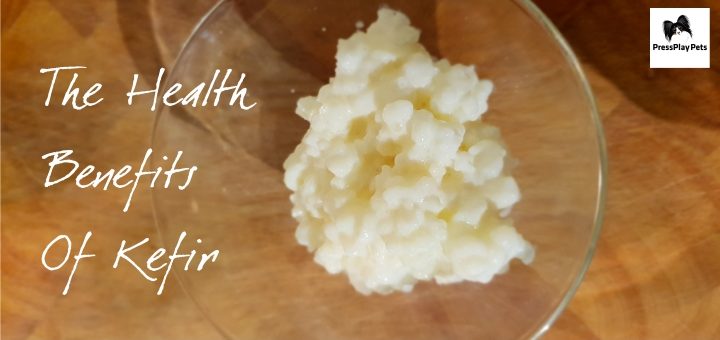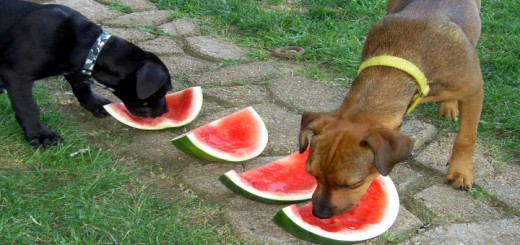If you have never read about the amazing health benefits of Kefir than both you and your pet are missing out on something truly amazing!
The history of Kefir (pronounced “kah-fear”) is a bit of a mystery but what we do know is that the local people of the Caucasus Mountains are said to have discovered this “miracle grain” back at least 1000 years ago.
The “grains” are not actually grains at all (so Gluten Free people rejoice its ok for you too)! They are actually living micro-organisms that occur naturally in nature. In fact they look more like cottage cheese than a grain. Traditionally cultured on cow, sheep or goats milk, it can also be made on soy, coconut, rice, or even almond milk. (If milk is not your thing than water Kefir grains made on coconut or sugar water produces a slightly bubbly and refreshing drink that is a great alternative to high sugar and acidic frizzy drinks, but it’s just for the humans!).
With a tart taste similar to that of natural yoghurt. Milk Kefir can vary in texture depending on the temperature and how long it is cultured. I find in our Australian climate (particularly Queensland where I live) I get a mix of consistencies; during the winter months it tends to be more like milk whilst during the summer months a thicker consistency much like yoghurt is produced.
What Are The Health Benefits Of Milk Kefir?
Milk Kefir may contain up to 61 different live and active cultures and 25-30 billion Colony Forming Units (CFU) and 11 grams of protein, while yoghurt has around 1-5 strains and 6 billion CFU and 6 grams of protein. Kefir has much more gut-friendly probiotics than its yoghurt cousin!
Just start googling the health benefits of milk Kefir and you will read that it has been linked to some extraordinary health benefits such as:
- Helps to maintain sugar levels
- Acts as powerful probiotics on gut-health
- Helps lower bad cholesterol
- Has antibacterial properties; can stop the growth of Salmonella, Helicobacter pylori & E. Coli
- Improves bone health
- Boost the immune system
- Lower in lactose that milk
- Protective against cancer; by helping to stabilize your immune system
- Can help improve digestive problems
- Fights tooth decay
- Helps fight allergies
- Helps in weight loss
- Improves skin health
- Relieve reflux
- Heart friendly; contains vitamin K2 which is essential to heart health
……………………Just to name a few!
How Do You Make Milk Kefir?
Firstly you need fresh live milk Kefir grains. Depending on where you live will depend on how easy they are to get. Just ask around on some social media platforms or friends and family someone will no doubt be more than happy to give you a couple of tablespoons (yes that is all you need to get started). I got my very first batch (2 tablespoons) from my mum quite a few years ago. I have been making milk Kefir at home every couple of days ever since.
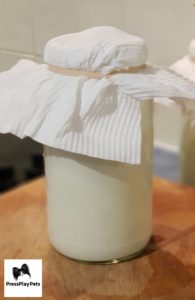
Now Let Your Kefir Work It’s Magic
Put your Kefir grains into a large glass bottle. Pour in 1 cup of milk per tablespoon of Kefir. Using a rubber band secure either a paper-towel or cheese cloth over the opening so that the milk can breathe and bugs don’t fall in.
Pop your Kefir onto the kitchen bench (away from direct sunlight) at room temperature for 24 – 48 hours (I tend to go 48 hours in winter and 24-38 hours in summer). Give the grains and milk a little stir every 8 hours or so with a plastic spoon.
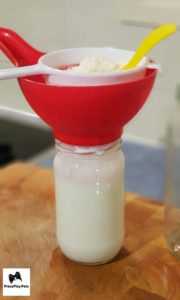
It’s Ready To Strain!
When the fermenting process is done, use a plastic or stainless steel strainer and funnel to strain the milk Kefir into another clean bottle. Pop the Kefir milk into the fridge for you and your pets to enjoy!
Finished milk kefir can be stored:
In aircon room temperature (20-25°C) = 1 to 2 days
In the refrigerator = 2 to 3 weeks
In the freezer = 1 to 2 months or longer, just like ice-cream
You will now be left with your Kefir grains in the strainer to make another batch! Super easy!
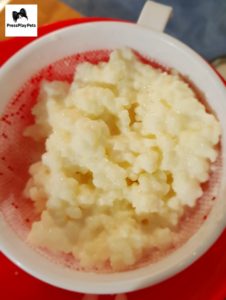
Your Magic Grains Are Now Ready To Make A New Batch!
Note: If your grains are happy they will start to grow over the coming weeks. If may find you are getting too many for your bottle! Lucky you! Don’t toss them out….these precious grains can be feed as they are to your dog or cat; you can even pop them in a blender and make yourself a yummy smoothie or maybe offer a couple of tablespoons to a friend to get them started!
How Much Should I Drink?
Recommended minimum daily intake of milk Kefir for humans is about 200-300ml of fresh milk Kefir a day.
How Much Should My Dog or Cat Drink (milk) or Eat (grains)?
Recommended Minimum Daily Intake of Milk Kefir for Dogs & Cats:
Small size dogs or cats – 1 tsp. – 1 tbsp.
Medium size dogs – 1 – 2 tbsp.
Large dogs – 2 – 3 tbsp.
(Give your pet’s system time to adjust. For the first few days to even a week try half the recommended dosages. This will avoid digestive upset as your pet’s system adjusts to the increase of good flora in their gastrointestinal tract).
Kefir can work miracles for you and your pet’s body! So don’t be afraid to give milk Kefir a go…..try making it at home! I love making Kefir cream cheese, dips and so much more! Just remember the golden rule: start by introducing it slowly into you and your pet’s diet. In no time everyone will feel the amazing benefits this “Miracle Grain” has offered millions of people all over the world for centuries!

Yummy….I LOVE milk Kefir Grains!
Author Bio: Nikki is pack leader at Pressplay Pets, a blog for the modern age pet parent interested in health & care, news, reviews & personal accounts of unconditional love & at times heartfelt pain of pet parenting. She is also proud mum to cute and cheeky Papillons ‘Amber’ and ‘Indy’!
Follow Pressplay Pets blog:
Follow Instagram, Facebook and Twitter
Pressplay Pets a blog for the modern age pet parent interested in health & care, news, reviews & personal accounts of unconditional love & at times heartfelt pain of pet parenting!
Follow Us!